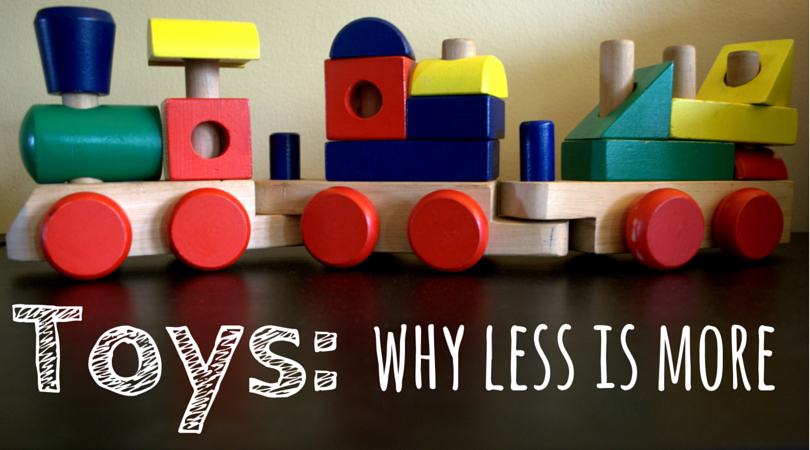Chances are, if you have children, you’ve watched toys slowly take over your home. Many parents say, “we have too many toys,” but defend this choice in the same breath.
But stop and think for a moment: how does your child behave when he’s surrounded by a hoard of toys? Content? Calm? Focused? More likely to share?
A huge toy collection does more harm than good. Too many toys create distraction, stifle imagination, and leave kids wanting more, more, more.

Fewer toys = more attention
Have you ever felt your attention and focus bounce around when you try to focus in a cluttered, messy space? When R. was just a baby, I noticed he’d get more fussy and riled up if his entire toy collection lay scattered across the floor. I can totally relate because I react the same way.
An uncluttered environment begets an uncluttered mind. For ADHD families especially, reducing excess stimulation and distraction will create a more peaceful home.
Play isn’t their only job, and entertainment isn’t yours
My kid loves to play, and he does it often, but there are also days when he doesn’t touch his toys. We only do two organized activities — Music Together and an informal weekly playgroup — so it’s not like he’s out of the house nonstop.
He’s only two, but R. helps me a lot. He accompanies me on all my errands, helps change and wash the linens every week, and has recently begun setting the table before dinner.
I don’t make him do any of this. I invite him to participate, give him a spare cleaning rag, let him have a turn with the duster. When I noticed him acting out while I was making dinner, I started handing him napkins. “We need one of these on each placemat,” I told him. He ran back into the kitchen for more. I handed him forks. When he returned again, I gave him a glass: “this one goes on Daddy’s placemat.”
Our kids learn their role in the family from us. When they try to insert themselves into a situation, do we shoo them away to their toys or do we find a way to include them? Do they view themselves as a nuisance or as a person who helps get jobs done around the house? Do they view themselves as competent or incompetent?
If your kids are busy participating in the household, they won’t need as many toys to occupy their time. I’m not saying we shouldn’t have fun with our children or let them play. I never demand R. put down a toy to do a job for me. But we also need to teach them the skills they’ll need for a successful, independent life. We need to teach them what it means to be valuable part of a family unit.
Engage imagination, not insatiability
In one study, researchers removed all the toys from a kindergarten classroom. The kids got bored at first, but soon invented games using only their surroundings and their imaginations.
Simply put, your kids’ brains will work harder when they’re not overwhelmed by toys and games. This is a good thing.
Not only that, reducing material possessions will lessen your child’s focus on them. He’ll direct his attention elsewhere instead of cultivating the insatiability toy companies (and advertisers) are hoping for. ADHD’ers know a thing or two about insatiability, anyway, so we especially need to be on guard.
In case I’ve given you the wrong idea, I’m not saying kids should live a bleak, austere existence and be put to work as soon as they can walk. I’m all for fun, educational toys and plenty of time to do their own thing.
However, we need to be honest with ourselves about why we’re filling our homes with all these toys. And then we need to learn how to let (most of) them go. Our kids will be happier for it.
Do your kids have too many toys? Too few? How do you make decisions about how many and what kind of toys to allow in your home?
Hey there! Are you enjoying The ADHD Homestead?
Here's the thing: I don't like ads. I don't want to sell your attention to an advertising service run by the world's biggest data mining company. I also value my integrity and my readers' trust above all, which means I accept very few sponsorships/partnerships.
So I'm asking for your support directly. For the cost of one cup of coffee, you can help keep this site unbiased and ad-free.
Below you will find two buttons. The first lets you join our crew of Patreon pals and pledge monthly support for my work. Patrons also have access to my Audioblogs podcast. The second takes you to a simple donation page to pledge one-time or recurring support for The ADHD Homestead, no frills, no strings. Do whichever feels best for you!

